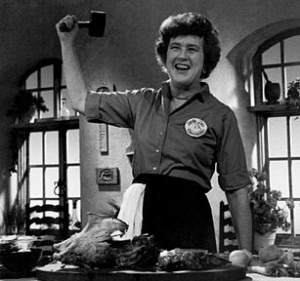The Problem with Pants

IF THIS WOMAN had been wearing pants, would she be the same? (more…)

IF THIS WOMAN had been wearing pants, would she be the same? (more…)
DAVID writes:
This past week, quite a controversy erupted when an anonymous author at Catholicity.com posted this article suggesting that women refrain from wearing pants because they are, according to him, intrinsically immodest and therefore evil. His tone was quite condescending to women. In particular, you will note the paragraph suggesting that men accompany their wives to clothings stores in order to guarantee their wives will not pick something immodest. Well, as you might expect, the article infuriated many women, and as the old saying goes, “Hell hath no fury like a woman scorned.” Simcha Fisher, author of the Catholic blog I Have to Sit Down, launched the first attack against the article here. Promptly following her lead was And Sometimes Tea author Erin Manning, and finally, Mark Shea joined the fight as well at Catholic and Loving It. You would think this is a small matter, this question of whether to wear pants or skirts, but the arguments lasted for days – and in many cases became quite nasty. In my view, the root of the tumult is the wounded relationship between Man and Woman. So in addition to pants, skirts, modesty and lust, there was talk of male domination and sexual dysfunction, feminism, the proper interpretation of Ephesians 5 and other scriptural passages, the depravity of our culture, and neutered masculinity. (more…)
ANTHONY ESOLEN, in two recent articles at Touchstone magazine, offers ten reasons why homosexual marriage is wrong. I highly recommend his arguments, which are aimed at a non-religious audience. In the last of the two articles, he offers a compelling account of why men become homosexual. The perfectly normal desire for male companionship and approval leads to an obsession with male love. He writes:
Before the current wave of political advocacy, many psychologists who studied homosexual men did come to some plausible conclusions about the same-sex attraction. From their studies and from what I know about the nature of boys, I offer the following alternative theory to explain male homosexuality. (more…)
JULIA CHILD supposedly detested the word ‘housewife.’ She was a great cook, but was she a lousy wife? In this entry, a reader contends Mrs. Child emasculated her husband, Paul. Here, another reader disagrees.
MRS. P. writes:
Paul Child strikes me as a man who was his own person and not easily emasculated by anyone let alone his loving wife and closest friend Julia. The pair married in 1946. She was in her early thirties at the time. He was ten years her senior. When Paul passed away in 1994 after a long illness, the Childs had been married 48 years. (more…)
NORA WRITES:
I just discovered your blog and very much appreciate some of the thought-provoking articles and arguments on it. The entry on home economics was a bit nostalgic for me as it was part of the elementary school curriculum starting in second grade at a Benedictine convent school for girls. In our school it consisted of learning how to sew, embroider, and crochet for the first few years, and then cooking/baking classes in sixth and seventh grade. Yes, we second grade girls were handling dangerous objects like needles and scissors without incident. Imagine that. I believe the boys’ school down the street had their own version of the class involving carpentry and household repairs. (more…)
THE U.S. COMMISSION on Civil Rights Conference took place at the National Press Club in Washington this week. Policy analysts discussed the state of the black family, apparently without mentioning a word that was so crucial and yet largely ignored in the Moynihan Report of 50 years ago. That word is matriarchy. Black society in America is matriarchal. Welfare helped push the black family in this direction, but an end to welfare, which has not yet been achieved, will not restore it as long as black women are sexually free and economically independent.
The blogger Natassia, who is a commenter here, has put together a good summary of the conference proceedings. There are glimmers of sense in the remarks by conference participants, especially from Heather MacDonald and Kay Hymowitz of the Manhattan Institute. MacDonald said: (more…)
AN EXCHANGE of e-mails about The Thinking Housewife was sent to me and I promised to respond to it. The exchange between two men is posted below, with some minor editing changes. My response follows.
Fred writes:
Lots of interesting ideas from this right-wing website. It reminds me of how things used to be — some of what used to be was good, some was bad — a lot of the good got thrown out with the bad.
A huge loss was the idea of a one living wage job per household — this was the good reason to discriminate against women joining the workforce. We should have kept that rule, but with modifications. (more…)
BOYS AND GIRLS are different; they do not easily learn side by side as children. Segregated schools make sense. A British reality show about a school for boys is drawing some attention to this long lost idea. Gareth Malone, who made his name in the series The Choir, is star of the show Gareth Malone’s Extraordinary School for Boys. Malone recently told The Sunday Times, “I’m very interested in boys’ disenfranchisement.” He said boys need “risk, competition, physical activity and immediacy.” (Unfortunately, his idea of risk appears to be climbing a tree with a harness and a rope.) (more…)

WILLIAM STEWART writes:
I’m not sure the scene depicted in your picture and caption is as innocent as it seems on the surface; in fact, I’m inclined to think otherwise. I don’t think the teaching in the public school system, of skills previously taught at home, was a good thing, because the teachers of “domestic science,” “household science,” or “home economics,” etc., tended towards an elitist view, that only experts knew how to properly cook according to the new “scientific” understandings of “hygiene,” and that what a girl might learn from her mother at home was no good, as that lady didn’t have the benefit of “scientific knowledge” that such self-appointed “experts” did. (more…)

MEAT EATERS are imperialists. Their refusal to trade the fatted calf for edamame or chickpeas is proof of aggressive instincts and fundamentalism, both political and dietary. The meat eater is a colonialist at heart, a supremacist of one kind or another. The vegetarian stands for world peace and tolerance, the carnivore for hatred.
The burger, in particular, is a symbol of all that is wrong with Western civilization. Most everyone likes it anyway.
Julia Child was inspirational in the field of burger cookery, even though she specialized in French cuisine. In general, Mrs. Child reveled in meat and was unapologetically Western compared to today’s fusion cooks. Mrs. Child’s burger recipes are excellent and simple. They are also somewhat counter-intuitive. Adding heavy cream to hamburger is not something that naturally occurs to us, but it works. (more…)
A READER writes:
IN THIS previous discussion, a reader asks:
How is [the pervasive sublimity of Muslim architecture – or, for that matter, poetry or spirituality] possible for a civilization that is “inherently false and evil”?
This is an important question (although, for clarification, it is important to note that I never asserted that Islamic civilization was false or evil, but Islam itself.) This question is important not just in regard to Islam but to all false doctrines that flourish, produce admirable works and create some civilized order. Please see Kristor’s outstanding and succinct response. In a few paragraphs, he explains why evil must and always will coincide with the Good. He writes:
If Islam is false, then Muslim saints, poets and architects who approach sublimity are all the more remarkable, for they have won through to the Good at the heart of all things despite their false religion. It should hardly surprise us that there are Muslims who have scaled such heights. The falsity of their religion does not annihilate their appreciation or capacity for beauty or goodness. Nothing can persist unless it has some good and truth in it. So even Islam expresses some truths. And everyone, no matter how many false beliefs he may hold, must if he is to live perforce confront and deal with the world as it really is: so that the truth of things must press upon him, and shape him. Anything that is, then, may by being the handiwork of God be also for some creature the occasion of a theophany.
FEISAL ABDUL RAUF, the imam promoting the Ground Zero mosque, is a man for his time, the perfect lubricant for an ecumenism that acknowledges faith and at the same time renders it meaningless. See this excerpt from his book What’s Right with Islam in which he argues:
The language of good versus evil is precisely the language of the fundamentalists whose worldview we oppose. Once we define as evil those who counter us, we lose the moral high ground and begin to descend an exceedingly slippery ethical slope.
Sufis teach that we first must battle and destroy the evil within ourselves by shining upon it the good within, and then we learn to battle the evil in others by helping their higher selves gain control of their lower selves.
I recommend the reader Brendan’s excellent commentary in this post. He writes: (more…)
CHRISTOPHER BURCHFIELD writes:
In 1981, the U.S. Forest Service entered into the Bernardi Consent Decree against the advise of its own attorneys within the Department of Justice. In essence, the Washington Office determined that 43% of its employees, within each of its some sixty professions and trades, should be women. Beginning, ironically enough in 1984, through the year 2000, a mass exodus of men with “on the ground knowledge and skills” took place in a purge so extensive that today no institutional knowledge of the 174 individual forests remains. (more…)
LADY GAGA is an “overconceptualized and claustrophobic” performer whose image as “the voice of all the freaks and misfits of life” is slick marketing. So writes Camille Paglia in a long profile of Gaga in today’s Sunday Times. Paglia writes:
There is a monumental disconnect between Gaga’s melodramatic self-portrayal as a lonely, rebellious, marginalised artist and the powerful corporate apparatus that bankrolled her makeover and has steamrollered her songs into heavy rotation on radio stations everywhere. (more…)
PETER S. writes:
I find in practice that I rarely disagree with Laura on essential matters, and am rather pained to do so now. With respect to the vigorous defense of traditional Christianity against Islam, this is perfectly in order and perfectly justified. Christian civilization, to the degree that it can claim to be at all integral, has a right and necessity to defend its boundaries, both political and intellectual. Further, as much as one might be attracted to the possibility of mutual respect and understanding, this is of little point if such requires either the dilution of theological positions or the unilateral letting down of guard.
And yet, in light of the assertion that Islam is inherently false and evil, I am haunted by the thought of Mevlana Jelaluddin Rumi. (more…)

PIZZA is to Americans what manna was to the Hebrews: a source of wonder and sustenance. Pizza, in all its forms, sustains us in the desert of modern life. It does not fall from the heavens, but it might just as well because it is available on almost every block. At this very moment, thousands of 18-wheelers are traveling the nation’s highways, hauling the necessary rubber cheese and factory dough to busy pizza vendors. Any town that is halfway civilized is a center of ceaseless pizza production. The “pizza paunch” is proof of this ongoing miracle.
Here is important breaking news on the pizza front.
The actress Julia Roberts, star of Eat, Pray, Love, says that pizza consumption has given her a fuller bust. The latest photos of Julia clad in a bikini while on vacation suggest she has undergone a transformation. But Julia says she did not have surgical augmentation. She just ate more pizza. (more…)
LAWRENCE AUSTER writes:
There may be no excuse for it, but there is a very compelling and authoritative reason for the Vatican’s statement this week that the Koran must be respected and protected by Catholics. I discussed this reasoning several times in 2006-07 following the Regensburg Lecture Jihad and the pope’s pathetic surrender thereto. Why did he surrender to the rioting Muslims and renounce the penetratingly critical statements about Islam that he had made in Regensburg? Because the Church’s own authoritative documents from the Vatican II period, implanted in the Catholic Catechism, require Catholics to look at Muslims as “fellow adorers of the one God.”
Here is a 2007 entry at VFR in which I discuss the Catholic Catechism’s teaching on Catholics’ relationships with Islam. I’m quoting the entire initial entry. (The discussion following the iniitial entry is lively and I recommend it too.): (more…)